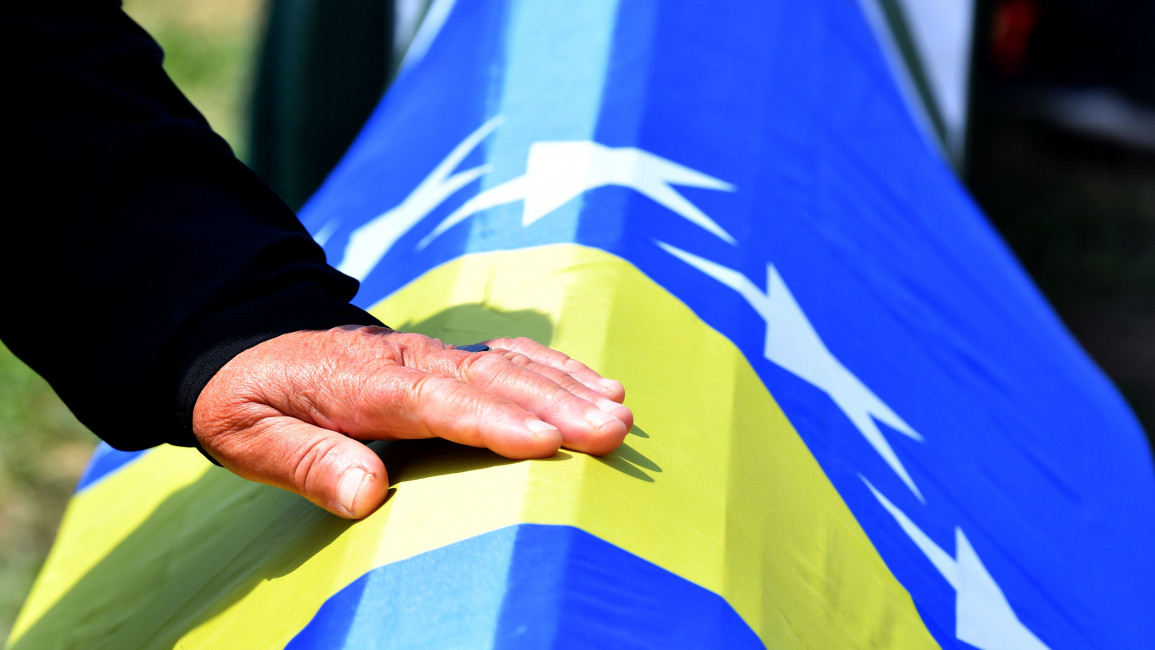
Why Biden can't ignore Bosnia's fragility

Considering then-Senator Joe Biden’s position in favour of intense military intervention against Slobodan Milošević's government in the 1990s, many in Bosnia and Herzegovina (BiH) were optimistic about what his presidency could mean for the Balkans.
Bosniaks had expectations about the Biden administration putting pressure on Milorad Dodik, the current Serb member of the Presidency of BiH and strongman of the Republika Srpska (RS) who is blockading BiH’s state institutions and threatening BiH’s Daytonian equilibrium.
In early October 2020, the Balkans researcher Jasmin Mujanovic wrote that a Biden win could prove “catastrophic” for Dodik, describing the RS leader as “the perfect target for a White House looking to reassert a dynamic position in an increasingly geopolitically volatile Europe”.
As Mujanovic put it at the time, “striking at Dodik is a cheap and simple way for a new U.S. president to send a signal: America has returned”.
"With Bosnia's elections set for later this year, there are legitimate concerns about the Daytonian equilibrium falling apart"
Team Biden’s boldest action against Dodik came in January 2022 when the US imposed new sanctions on Dodik, accusing the RS boss of corruption and threatening BiH’s stability and territorial dignity. Those fresh sanctions also targeted Alternativna Television, a Banja Luka-based media outlet, along with other Dodik-affiliated officials.
Those sanctions were “a step forward because [Dodik] has escalated tremendously, starting in 2021,” said Reuf Bajrović, a former Bosnian government minister, in an interview with The New Arab.
Despite the sanctions being important, they are merely a “statement of intent and there must be things coming after sanctions we haven’t seen so far,” argued Bajrović.
He said Biden’s administration should work to give the Sarajevo-based Office of the High Representative (OHR) more teeth to prevent lower-level institutions in BiH from doing as they please unilaterally.
For the last 15 years, according to Bajrović, the Europeans have been running the show in ways that keep the OHR “dormant” and the US should play a more assertive role vis-à-vis this institution.
Established in 1995 in accordance with the Dayton Accords, the OHR is the international institution in BiH which has jurisdiction over the implementation of the “final interpretation” of civilian aspects of the peace agreement.
The body aims to move BiH toward democratisation and integration into the EU. Roughly three-quarters of the OHR’s funding comes from the EU and the US. The rest mostly comes from Canada, Japan, Russia, and the Organisation of Islamic Cooperation (OIC).
Yet, some experts warn that in practice using the OHR to put Dodik in check could result in deadly violence.
“Contemplating that option would have to be done from the perspective of possible or even likely rejection of Dodik to respect that decision of the [OHR] because Dodik has repeatedly over the years stated that in case any high representative or any other international official tries to remove him from office he would not respect that,” said Srecko Latal, the regional editor for Balkan Investigative Reporting Network and an independent expert.
|
|
Dodik would probably call on the OHR to physically remove him. His security along with RS police would clash with any force going to Banja Luka to drag him out of office.
Therefore, “any planning of these kinds of sanctions should also take [into] consideration the need for very clear physical or military support from [European Union Force Bosnia and Herzegovina (EUFOR)] to ensure that this decision is in fact implemented,” explained Latal.
“If Dodik would declare independence suddenly today—and if the OHR would use Bonn Powers to remove him from office tomorrow, I’m not 100 percent sure that EUFOR would support this kind action…That scenario would risk major escalation of the crisis not only in [BiH] but also the rest of the region.”
War in Ukraine
One can’t understand the current dynamics in BiH’s political crisis without taking stock of wider developments across the Western Balkans and Eastern Europe.
“Dodik openly calls for independence of RS, with a promising option of joining with Serbia in the near future,” Leila Bičakčić, the executive director of the Centre for Investigative Reporting, told TNA.
“That was the goal of the war in the 1990s. Croats, on the other side, are openly calling upon a third entity, masked in the re-establishment of Herzeg Bosnia, a territory in Herzegovina that was ethnically cleansed by Croats during the war in the 1990s,” she added.
“Amendments to the Election Law that are supported by Croats and Croatia officially are calling upon creating a separate electoral unit that would be predominantly constituted by Croats from territories that are formerly known as Herzeg Bosnia.”
"Milorad Dodik, the current Serb member of the Presidency of BiH and strongman of the Republika Srpska, is blockading Bosnia's state institutions and threatening BiH’s Daytonian equilibrium"
Russia strongly supports and encourages Dodik’s revisionist and revanchist agenda. Prior to the war in Ukraine, there were growing concerns about Putin’s “little green men” arriving in Banja Luka via Serbia.
Their presence could have tipped the balance in BiH so that RS could successfully break away from the rest of the country in ways that would have been similar to how Russian forces have enabled separatists in Moldova’s Transnistria, Ukraine’s Donbas, and Georgia’s South Ossetia to achieve de facto independence from governments in Chișinău, Kyiv, and Tbilisi.
In fact, when Dodik was in Russia last month, he compared Donetsk and Luhansk to RS.
But the Ukraine shock earlier this year prompted Dodik to scale back somewhat, causing tensions to decrease.
“The Russian proxies [in BiH] are very scared of what went on in Ukraine,” Bajrović told TNA. “The Russians, as a result of the war in Ukraine, can’t project power to the region. They can’t fly into the Western Balkans anymore because Romania, Bulgaria, and other NATO states have [deprived Russia] of overflight rights…The Serbs who are pro-Russian are cut off from the mothership.”
From the standpoint of Dodik’s interests, this development has been highly problematic, causing the RS strongman to step back and lay low for now.
|
|
Yet the possibility of Russia 'winning' in Ukraine can’t be ruled out. If there would come a point in the future whereby Moscow successfully installs a geopolitically “neutral” government in Kyiv, the Russians would be able to fly from Russia to Ukraine, before entering Hungarian and Serbian airspace to land in RS. At that point, Dodik would be in a far stronger position to act more boldly with help from Moscow and Belgrade.
Looking ahead, with BiH’s elections set for later this year, there are legitimate concerns about the Daytonian equilibrium falling apart regardless of developments in Ukraine.
Under such a scenario, the Biden administration would need to make difficult decisions. Among experts there is a largely shared view that “these elections will validate and confirm this final collapse of the Dayton Peace Accords,” said Latal.
“For me, the question is not what will the US administration do if that crisis escalates? My question is, what will the US administration do when that escalates? That is very likely to happen by November/December this year.”
News recently came out that the OHR plans to introduce changes to BiH’s election law which would deprive any of the country’s constituent nations of representatives in the House of Peoples of the Federation parliament if they constitute less than three percent of any Federation entity canton.
This plan has received strong criticism from many Bosniaks who find it discriminatory and say it will politically empower the Croatian Democratic Union and the nationalist secessionist Serb SNSD party.
Bajrović called it an “incredibly dirty deal to create a 21st century Muslim-majority Rhodesia”.
According to Istraga.ba (an investigative portal), the Croatian government has been pushing for this change, which is heightening tensions and deepening divisions along ethnic lines in BiH a few months before the upcoming elections.
Among the Bosniaks and Bosnian Croats who want to see BiH align firmly with the West against Russia, there is a general desire for their country to join NATO.
For team Biden, pushing for BiH’s NATO accession is a “unique opportunity” and a “way of anchoring the region firmly with the West and ensuring that America's investment in peace in the Balkans is secured,” Hamza Karčić, an associate professor at the Faculty of Political Science at the University of Sarajevo, told TNA.
"Falling back into a conflict would give Moscow unique opportunities to further advance its agenda in the Western Balkans, especially if the tide in Ukraine shifts in Russia's favour"
“It is important the Biden Administration closely follows the situation in Bosnia to safeguard peace and stability. The best way to achieve this is to fast-track Bosnia's NATO accession. The Biden Administration has many high-level officials with a deep knowledge of Bosnia and ensuring Bosnia's place in NATO would also be a Biden Administration legacy,” added Karčić.
Nonetheless, given Dodik’s opposition to BiH joining NATO and Russia threatening the country with the ‘Ukraine treatment’ should Sarajevo decide to join the Western Alliance, there is good reason to doubt that BiH would soon be in NATO.
Under NATO’s own rules, countries currently beset by armed conflicts can’t be accepted, which for now rules out a BiH accession mindful of how Moscow- and Belgrade-oriented Bosnian Serbs and pro-Western Bosniaks could be expected to go to war against each other if the fragile country would begin the process of joining Europe’s premier security organisation.
These rules aside, it would be strategically unwise for NATO to bring in any new country where a civil war could possibly erupt because this would require the Western Alliance’s other members to immediately enter that conflict at the expense of NATO’s ability to focus on Ukraine.
Ultimately, the Biden administration will likely need to pay greater attention to BiH throughout the remainder of the year. A collapse of the Daytonian equilibrium would threaten not only stability in the Balkans but also the rest of Europe.
BiH falling back into a conflict would give Moscow unique opportunities to further advance its agenda in the Western Balkans, especially if the tide in Ukraine shifts in Russia’s favour.
At a time when Moscow would like NATO’s resources shifted away from Ukraine, the end of the Dayton Accords could create a new drain on Western governments with major implications for West-Russia relations.
Giorgio Cafiero is the CEO of Gulf State Analytics.
Follow him on Twitter: @GiorgioCafiero




